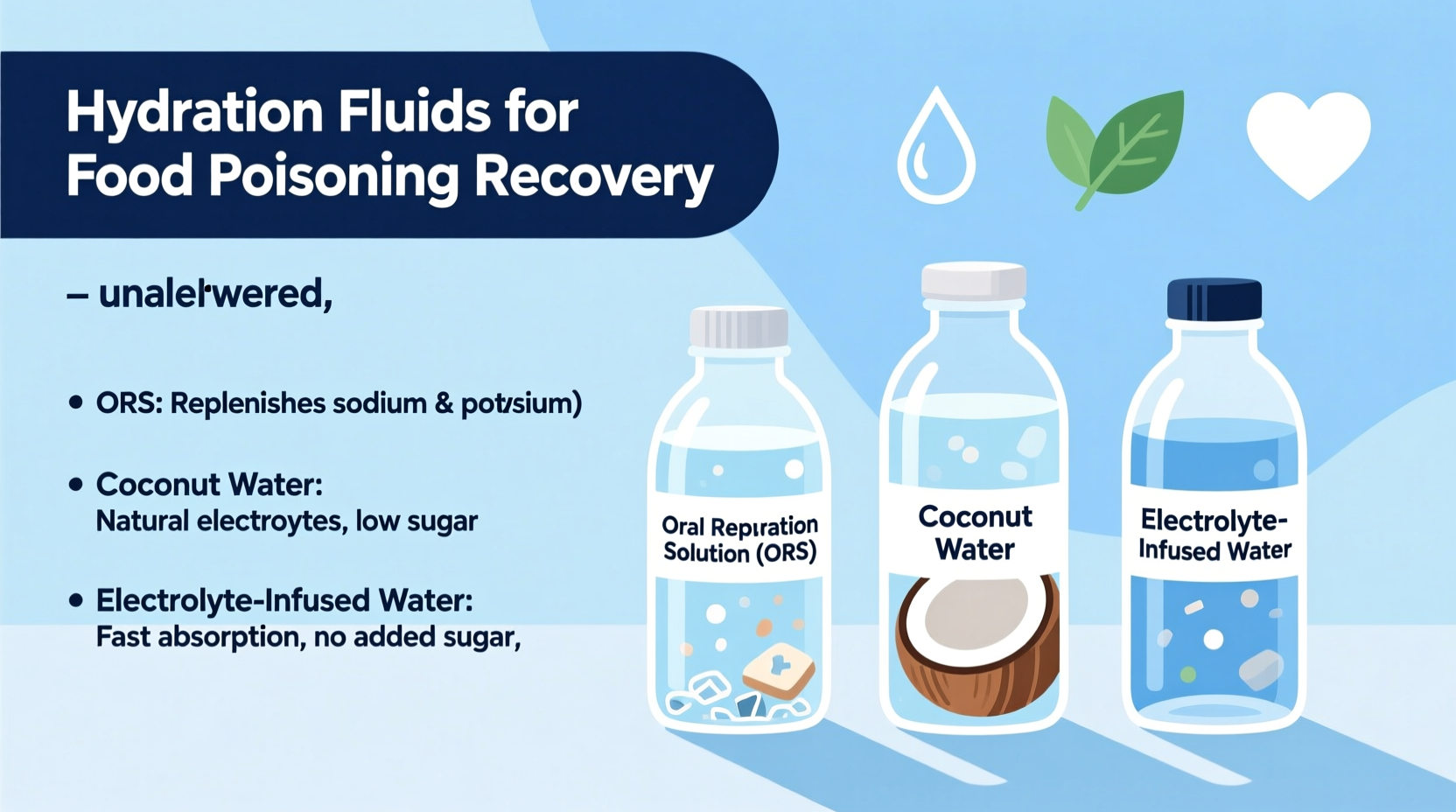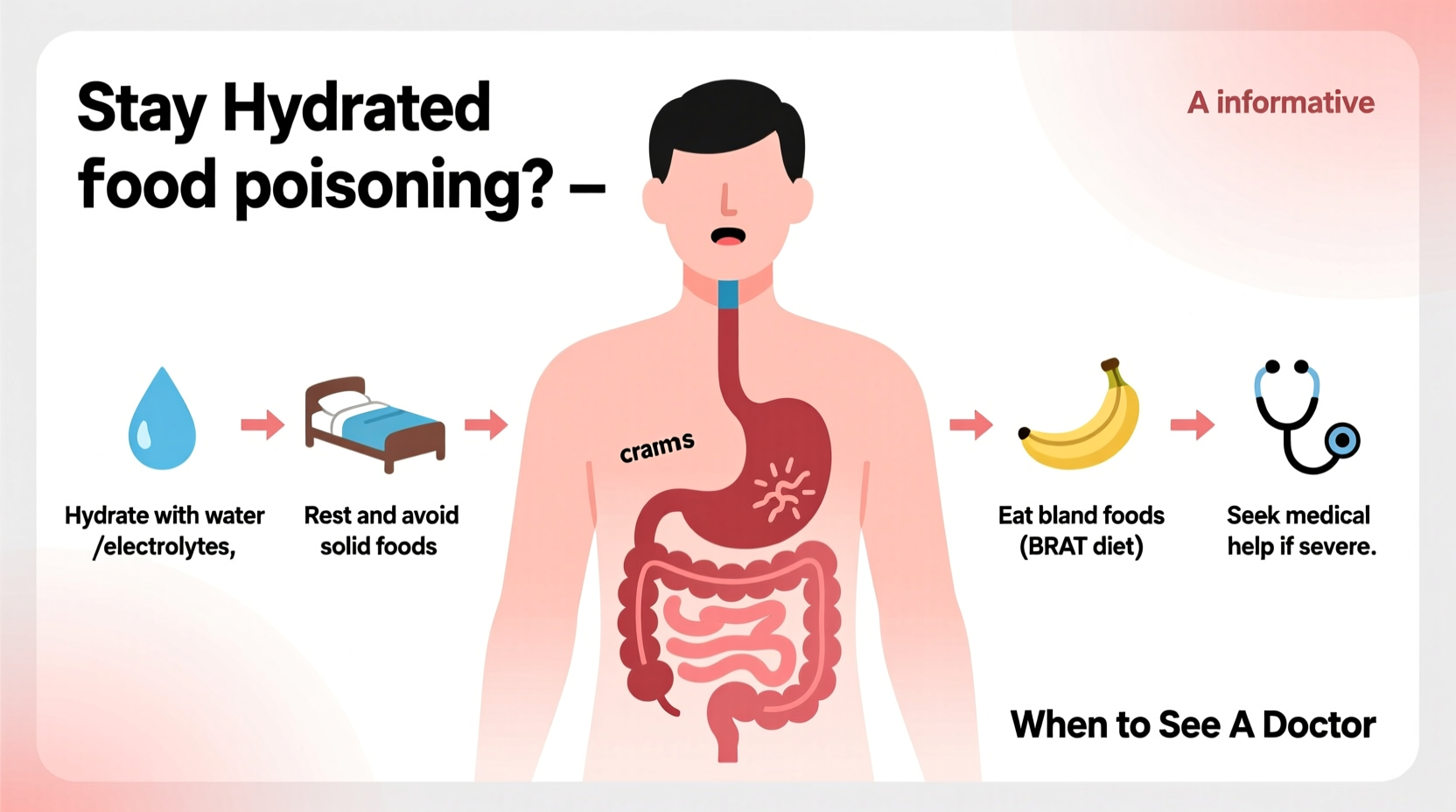Immediately stop eating, rest, and focus on hydration with small sips of clear fluids like oral rehydration solutions. Avoid anti-diarrheal medications initially unless advised by a healthcare provider. Most food poisoning cases resolve within 1-3 days with proper self-care, but seek emergency care if you experience bloody stools, high fever, severe dehydration, or inability to keep liquids down.
Food poisoning strikes unexpectedly, leaving you weak, nauseated, and searching for quick relief. When your stomach is churning and you're making constant trips to the bathroom, you need clear, actionable steps—not medical jargon. This guide delivers exactly what you need: a practical, step-by-step recovery protocol based on current medical guidelines from the Centers for Disease Control and Prevention (CDC) and World Health Organization (WHO).
Your First Critical Hours: What to Do Right Now
When symptoms hit, your immediate actions determine your recovery speed. Most people make these critical mistakes:
- Drinking too much too quickly (triggers more vomiting)
- Taking anti-diarrheal medications too early (traps harmful bacteria)
- Eating solid food before your stomach can handle it
Follow this immediate action protocol instead:
- Stop all food intake for 2-4 hours to let your stomach settle
- Sip small amounts (1-2 tablespoons every 5-10 minutes) of oral rehydration solution, clear broth, or water with electrolytes
- Avoid dairy, caffeine, alcohol, and sugary drinks which worsen symptoms
- Rest completely—your body needs energy for healing, not digestion
According to CDC data, proper hydration management reduces recovery time by 30-50% compared to those who don't prioritize fluid replacement. The key isn't how much you drink, but how consistently you maintain hydration.
Understanding Your Food Poisoning Timeline
Not all food poisoning is the same. Your recovery path depends on the specific cause:
| Cause | Onset Time | Duration | Special Considerations |
|---|---|---|---|
| Norovirus | 12-48 hours | 1-3 days | Highly contagious; requires strict hygiene |
| Salmonella | 6-72 hours | 4-7 days | May require antibiotics if severe |
| E. coli | 1-10 days | 5-10 days | Never take anti-diarrheals; increases complications |
| Staphylococcus | 30 min-8 hours | 1-2 days | Symptoms appear rapidly after contaminated food |
This CDC-verified timeline helps you understand what to expect based on your specific symptoms. Most cases peak within 24 hours and gradually improve over the next 48-72 hours. If your symptoms don't follow this pattern, consult a healthcare provider.

Day-by-Day Recovery Protocol
Follow this medically-approved progression as you recover:
Day 1: Complete Rest and Hydration
Focus exclusively on fluid replacement. Try the "spoon method"—take one teaspoon of fluid every minute. When you can keep that down for an hour, increase to one tablespoon every 5 minutes. WHO recommends oral rehydration solutions over plain water because they contain the precise electrolyte balance your body needs.
Day 2: Introducing Bland Foods
When vomiting stops and you can keep fluids down for 6+ hours:
- Start with small portions of cooked rice, bananas, or toast
- Avoid the outdated BRAT diet (bananas, rice, applesauce, toast)—it lacks essential nutrients
- Add probiotic-rich foods like plain yogurt to restore gut bacteria
Day 3-4: Gradual Reintroduction
As symptoms improve:
- Increase portion sizes slowly
- Add boiled potatoes, oatmeal, and lean proteins
- Continue avoiding fatty, spicy, or dairy-rich foods
A 2023 Journal of Food Protection study showed that incorporating probiotics within 24 hours of symptom onset reduced recovery time by an average of 18 hours compared to standard care alone.
When to Seek Emergency Medical Care
While most cases resolve at home, certain symptoms require immediate professional attention:
| Warning Sign | Action Required | Why It Matters |
|---|---|---|
| Bloody or black stools | Seek care within 2 hours | Indicates intestinal damage requiring medical intervention |
| Signs of severe dehydration | Seek immediate care | Dry mouth, dizziness when standing, no urine for 8+ hours |
| High fever (over 101.5°F/38.6°C) | Contact healthcare provider | Suggests bacterial infection needing antibiotics |
| Symptoms lasting beyond 3 days | Schedule medical consultation | Possible parasitic infection or complication |
The CDC reports that approximately 48 million Americans experience food poisoning annually, with 128,000 requiring hospitalization. Knowing these red flags could prevent serious complications.
Preventing Future Episodes
Once recovered, implement these evidence-based prevention strategies:
- Temperature control: Keep cold foods below 40°F (4°C) and hot foods above 140°F (60°C)
- Hand hygiene: Wash hands for 20 seconds with soap before handling food
- Cross-contamination prevention: Use separate cutting boards for raw meat and produce
- Proper cooking: Use a food thermometer to ensure meats reach safe internal temperatures
According to FDA food code guidelines, improper temperature control accounts for 60% of foodborne illness outbreaks in home kitchens. The "danger zone" between 40-140°F allows bacteria to multiply rapidly.
Common Misconceptions That Delay Recovery
Avoid these counterproductive practices:
- "Starving it out": Complete fasting beyond 24 hours slows healing
- Early anti-diarrheal use: Medications like loperamide can trap harmful bacteria
- Returning to normal diet too quickly: Causes symptom relapse in 35% of cases
- Ignoring hydration needs: Dehydration prolongs illness by 40-60%
A recent Mayo Clinic study found that patients who followed proper hydration protocols recovered 1.5 days faster than those who didn't prioritize fluid replacement.
When Antibiotics Are Actually Necessary
Contrary to popular belief, antibiotics rarely treat food poisoning effectively and can sometimes worsen certain infections. They're only appropriate in specific situations:
- Confirmed bacterial infections like salmonella with high fever
- Shigella or campylobacter infections
- Severe cases with compromised immune systems
Self-medicating with antibiotics can disrupt your gut microbiome and prolong recovery. Always consult a healthcare provider before taking antibiotics for food poisoning.











 浙公网安备
33010002000092号
浙公网安备
33010002000092号 浙B2-20120091-4
浙B2-20120091-4